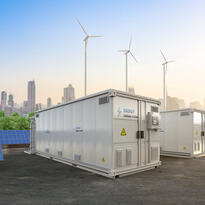ESS vs BESS: What’s the Difference?

April 18, 2023:
ESS vs BESS
You can’t pick up an electrification industry trade magazine lately without reading about new developments in the field of energy storage. The technology offers numerous benefits… It can smooth demands on the local electrical grid, negate concerns with solar/wind energy fluctuations, lower costs to end-users by avoiding peak-rate surcharges, harness the outputs of multiple sources of renewable energy, provide backup capabilities for critical infrastructure (i.e. hospitals), delay local Governments needing to invest in costly grid improvements, and more.
Often, the acronyms ESS and BESS seem to be used interchangeably. Both refer to Energy Storage Systems, which are used to store and release energy, but there is a difference between the two.
What is ESS?
ESS stands for "Energy Storage System." It is a broad term used to describe any system that stores energy for later use. This includes CHEMICAL (i.e. biofuels, hydrogen), ELECTROCHEMICAL (i.e. Batteries, Fuel Cells), ELECTROMAGNETIC (i.e. Inductors, Superconducting Magnets), THERMAL (i.e. latent heat), MECHANICAL (i.e. compressed air, flywheels), HYDRAULIC (i.e. pumped hydro storage, pressurized fluids) and HYBRID (i.e. battery-to-fuel cell) systems.
What is BESS?
BESS stands for "Battery Energy Storage System." Because batteries store electric energy as chemical energy (then convert it back to an electrical form when needed), it is a type of ELECTROCHEMICAL ESS. As such, BESS is only one of many sub-categories of the broad "Energy Storage System” (ESS) framework.
Contact us today to learn more!
